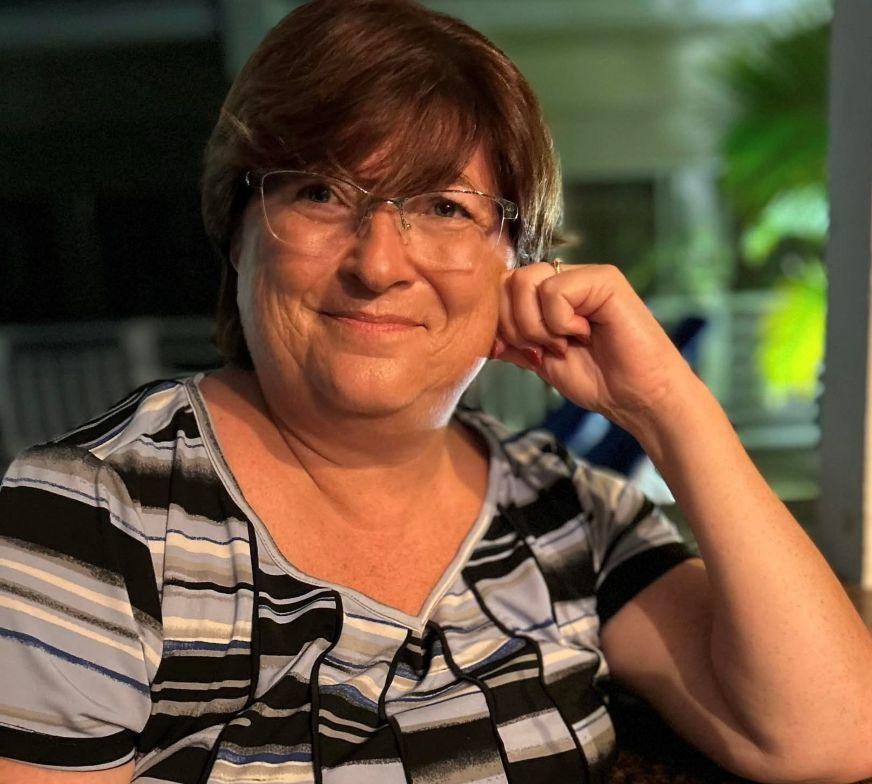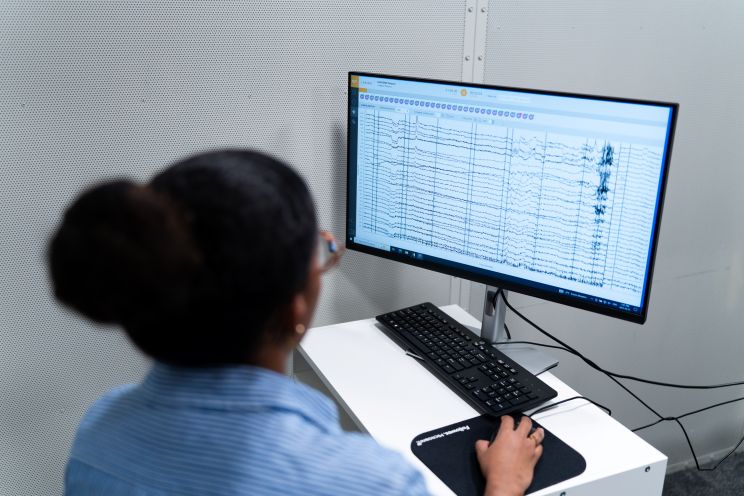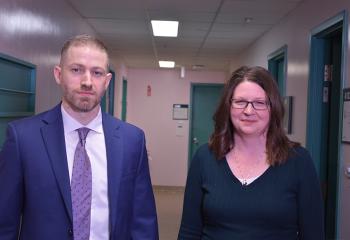
Sherri Topple has experienced the life-changing benefits of ketamine for treatment-resistant depression. With donor funding, more patients in Nova Scotia will have access to the treatment.
When Sherri Topple looks in the mirror, she sees something in her eyes that’s been missing for a long time: a spark.
“I have a great portion of my life back that I have been missing for years. I can contribute to my family. I can contribute to society. I can look at myself in the mirror and see that I have the spark in my eyes again. I care again. And for a long time I didn't. I was just merely existing. And that was on the best day,” says Sherri.
Sherri attributes these gains to the positive effects she’s experienced from ketamine therapy through the QEII Health Sciences Centre.
Last fall, Sherri discovered a study for ketamine therapy for people living with treatment-resistant depression. Led by QEII psychiatrist, Dr. Abraham Nunes, patients who have been screened for treatment-resistant depression receive two infusions over a span of nine weeks. Only one of the infusions is ketamine, and neither the participant nor the research team are aware of which is being administered.
As part of the study, participants attend multiple appointments, participate in interviews and surveys, and undergo EEGs (a medical test used to measure the electrical activity of the brain), while the research team collects data for analysis to determine if it is an appropriate treatment option for them.

Increasing mental health support and access
Dr. Nunes and his team are working with a small number of patients on a compassionate basis to show the efficacy of ketamine, helping to make it accessible for the approximately 17,000 to 25,000 Nova Scotians who are living with treatment-resistant depression.
According to Dr. Nunes, one patient is treated every two weeks, but once the program is established, up to eight patients a day can receive treatment.
“Through this research, we can establish a program for two years to show its effectiveness with the goal of securing provincial government funding, offering ketamine therapy to anyone who could benefit,” says Dr. Nunes.
That’s possible with donor support. The QEII Foundation is raising $370,000 for a ketamine therapy program at the QEII to treat more patients. As part of the Foundation’s $100 million We Are campaign, access to a donor-funded ketamine therapy program will help make mental health care more accessible and equitable.
And for someone like Sherri, who has been living with depression, anxiety and post-traumatic stress disorder (PTSD) for nearly five decades, the life-changing benefits of ketamine are invaluable.
Lifelong loss and grief
“There’s been a profound loss of very important people in my life,” Sherri says. “I've had a horrible relationship with grief my entire life. I thought I was remembering people and honoring them, but really, I was dragging ghosts with me. And not realizing it was unhealthy.”
It began with the loss of her beloved grandmother when Sherri was four years old, followed by the tragic death of her brother, who died of an aneurysm when he was 15.
But it was the death of her mother in 2013 that Sherri says was a turning point in her mental health. Ultimately, her mother’s death pushed her anxiety and depression to a different level.
“I still managed to work and achieve the goals I set for myself. I just learned again how to adapt to that new normal at a much more heightened illness. Without ever realizing how sick I was becoming.”
Seeking support nearly eight years ago, Sherri began to see a psychologist. It was the first time a therapist began to examine the compounded grief Sherri had been experiencing since childhood. Regular therapy and medication helped her learn how to cope with her grief, anxiety and depression.
Sherri was making strides in her treatment, but then her dad passed away from lung cancer just 17 days after he was diagnosed. Struggling with the loss of her father, Sherri also faced the responsibility of becoming the caregiver for her brother, Alec, who was born with cerebral palsy, and her disabled older sister, Lorna.
The stress began to manifest again for Sherri, impacting her mental health. And although she says she’s never experienced suicidal ideologies, she did start to “find where the bottom was.”
And then in June 2023, Sherri’s husband of 39 years was diagnosed with hereditary aortic aneurysm syndrome. The grief and trauma of losing her teenage brother to an aneurysm years ago and knowing that her three adult daughters had to be tested “broke” Sherri.
“Suddenly, my thoughts focused on the idea of losing everybody. The catastrophic thinking that happens when your brain is unhealthy is devastating.”
As Sherri and her family navigated the diagnosis, she continued to work with her psychologist and felt like she got to a point where she could “breathe again.”
A turning point
Prior to learning about the ketamine therapy research trial, Sherri had never realized she was living with treatment-resistant depression. Learning about the study was a turning point for her.
The night before the first infusion as part of the study, Sherri said she could barely sleep because of the anticipation. While she knew it wasn’t a guarantee that it would be effective, the option to try a new treatment left her feeling hopeful.
“As soon as the infusion started, I felt this immediate sensation. It was almost as if I was seeing the Northern Lights,” she recalls. “And the next morning, I sprang out of bed. I hadn’t done that in years.”
At her follow-up appointment with Dr. Nunes, she remembers feeling taller. She jokingly asked him if the treatment made her grow.
But that feeling is common for patients. Dr. Nunes says it’s attributed to feeling lighter.
“Some patients who we treat will say that 30 minutes into the infusion, they feel much lighter and everything lifts. You can see it in the way people move and the way they walk; they have a bit more spring in their step and a bit more life in their facial expressions. It's amazing,” he shares.
Six weeks later, when the study concluded, Sherri says she almost cried with joy when she was told by Dr. Nunes that she qualified to receive a full treatment of ketamine infusions; in Sherri’s case that was five. The treatment is funded by the QEII Foundation for patients on a compassionate basis who have exhausted all other options.
“I felt deeply fortunate that this funding was available and that I could continue to receive ketamine infusions through the QEII. I’d established that safety and trust with the team through the research trial and I wanted to continue,” Sherri says.
Sherri received five more treatments over two weeks last January, and she says the change has been unmistakable.
“I am in the glorious position now of learning who Sherri is as the 58-year-old adult who is finally becoming mentally healthy.”
Sherri says that as her symptoms of depression have improved, anxiety and PTSD have become more visible. "You only feel the pain from the worst. Depression stops you from feeling anything at all, but because I’ve treated the depression, I now have the mental capacity to tackle the other things.”
That was hugely important when she faced a bittersweet time in her life this spring.
'It did not derail me'
In February, Sherri was in Sweden to welcome her first grandchild and support her daughter. But just a few days into her month-long visit, Sherri’s older sister, Lorna, passed away unexpectedly back home in Halifax.
The devastating news, paired with her daughter’s long and difficult labour before welcoming her grandson, was challenging for Sherri, but ultimately, she made it through and was able to cope.
“I was experiencing excitement and terror, and everything all at once, yet it did not derail me. I was able to be present and supportive. And I was okay. I wasn’t just pretending to be okay,” she says. “Navigating that situation would not have been possible a few months ago before I started ketamine therapy.”
The power of hope
Today, Sherri says that her depression is in remission. And while she knows that doesn’t necessarily mean the effects of ketamine will last a lifetime, the hope is enough for now.
As a former employee of the Mental Health Foundation of Nova Scotia, Sherri says she heard a lot about hope and the power it carries for people. Now she’s experiencing it for herself.
“Having the hope that ketamine works for me is amazing. In my heart and my head, I experienced what hope can actually do for a person.”
To learn more or donate, visit QE2Foundation.ca/ketamine.

